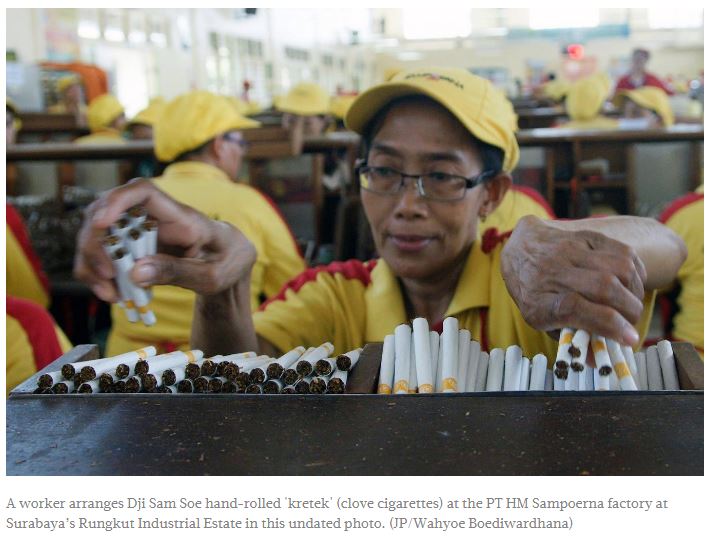Indonesia: Consumers prefer cheaper cigarettes as purchasing power weakens: Sampoerna
Consumers are looking for affordability when purchasing cigarettes as the increase in the tobacco excise and the economic impacts of the COVID-19 pandemic have hit people’s purchasing power, according to publicly listed cigarette maker PT HM Sampoerna.
Sampoerna president director Mindaugas Trumpaitis said consumers seemed to have a growing preference for products with higher tar concentrations, smaller packages and super-low prices.
“The pronounced impact of the COVID-19 pandemic has further eroded consumers’ purchasing power and has led to a shift in consumer behavior. In the cigarette industry, adult smokers are seeking bigger bang for their buck products,” Trumpaitis said during a virtual public expose on Friday.
“They are buying smaller packs because they are more affordable and they are buying higher tar products, including SKT [hand-rolled kretek], because they have more impact,” he added.
The company owns well-known brands, including Sampoerna A, Dji Sam Soe and Marlboro.
The market share of machine-made high-tar kretek (SKM HT) increased 3.6 percentage points in the second quarter of this year to 43.5 percent from the 39.9 percent booked during the same period last year. At the same time, the market share of low-tar SKM (SKM LT) declined 5.5 percentage points to 33.1 percent, Trumpaitis reported.
This so-called “uptaring” trend has also been seen in the increased market share of SKT products from 16.1 percent in June last year to 19.1 percent in June this year.
The shift to affordability has also been evident with the market share of smaller pack products – 10 or 12 cigarettes per pack – increasing 5 percentage points year-on-year (yoy) to 44.4 percent in this year’s first half. Meanwhile, the market share of super-low price brands climbed 5.5 percentage points to 19.2 percent during the same period.
“In the longer-term, this trend could potentially reverse as the economy improves,” Trumpaitis noted.
The Indonesian cigarette industry has been significantly affected by the excise-driven price increases this year along with the impacts of the coronavirus outbreak, which has battered business activity. Throughout the first half of this year, industry volume dropped 14.8 percent yoy.
The government has been increasing the cigarette excise in an effort to reduce the prevalence of smoking in the country. It increased the cigarette excise by 23 percent on average in 2020, following 10.4 and 10.5 percent increases in 2018 and 2017, respectively, Statistics Indonesia data show.
The excise increase for 2021 has yet to be decided.
Individually, HM Sampoerna reported that its market share had declined 4 percentage points to 28.2 percent yoy in this year’s second quarter from 32.2 percent. Trumpaitis explained that this was due to a downtrading trend, wherein consumers shift to cheaper brands, while additionally, the stricter mobility restrictions in urban areas had impacted the company’s performance as Sampoerna’s market share was higher in those areas.
However, the company also increased its market share in higher-margin products. Dji Sam Soe’ market share, for example, increased 50 basis point yoy as of the first half of this year to 4.2 percent.
Mirae Asset Sekuritas Indonesia analyst Christine Natasya wrote in a report in July that among the reasons behind Sampoerna’s sluggish second-quarter performance was a loss in market share on the back of uncompetitive pricing compared to lower-tier producers with similar variants such as Wismilak Evo.
“We believe [the company’s declining market share in this year’s second quarter] was mainly caused by the dramatic drop in the company’s sales volume during the quarter, given the large-scale social restrictions (PSBB), lower smoking appetite due to coronavirus and lower purchasing power of lower-income consumers, which was been worsened by the leap in the average selling price for lower-priced products”.
The price of Sampoerna’s stocks, traded on the Indonesia Stock Exchange (IDX) under the code HMSP, was unchanged on Monday morning at Rp 1,515 apiece. Throughout the year, the company’s shares have lost 27.86 percent of their value.
The consumer goods sector, on the other hand, has only lost 8.2 percent of its value during the same period. Meanwhile, the Jakarta Composite Index (JCI), the main gauge of IDX, has fallen 19.69 percent year-to-date.
Source: https://www.thejakartapost.com/news/2020/09/21/consumers-prefer-cheaper-cigarettes-as-purchasing-power-weakens-sampoerna.html


 Thailand
Thailand




